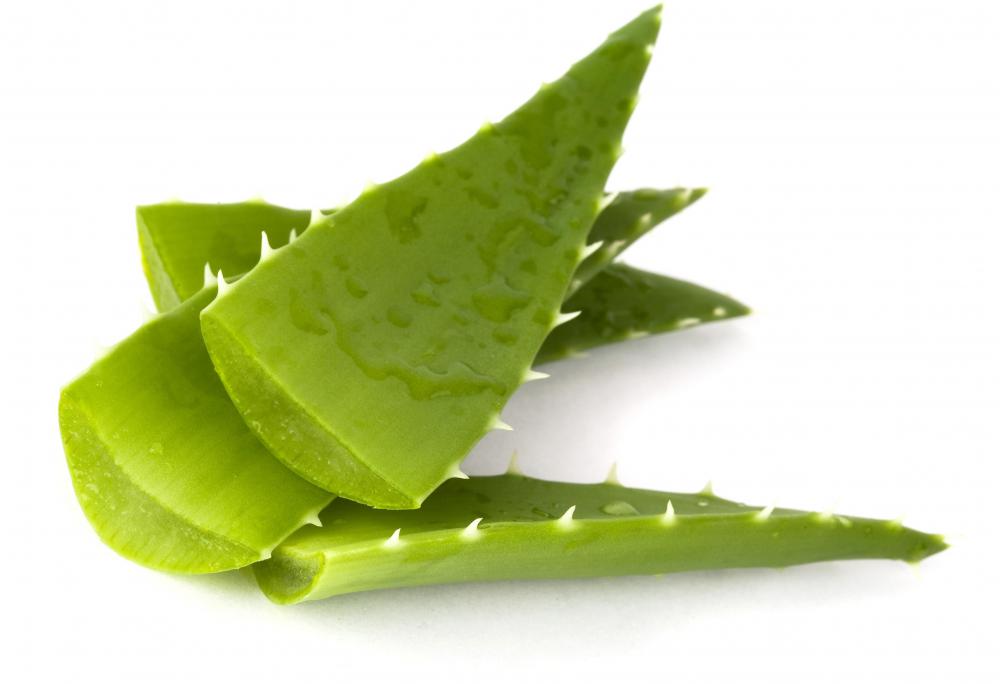At WiseGEEK, we're committed to delivering accurate, trustworthy information. Our expert-authored content is rigorously fact-checked and sourced from credible authorities. Discover how we uphold the highest standards in providing you with reliable knowledge.
How Do I Choose the Best Aloe Vera Oil?
There are a couple of different ways to choose between aloe vera oil options, but one of the first things to do is to think about why you want the oil in the first place. Extracts from the aloe plant can be used for a number of different things, and different strengths and preparations are often better for certain purposes than others. Skin sensitivity is another factor. Aloe is usually very mild, but in some people, full-strength or highly concentrated oil can cause irritation. It’s usually best to test the oil on a small area of your skin to see how you tolerate it before applying it to wider areas. Finally, you’ll want to pay careful attention to labeling. Many products contain aloe oil, but not all of them are pure preparations. If you’re looking for a blend, then a multi-ingredient oil might be best; but, if you’re looking for something full-strength, you should ensure that the oil is made with aloe extract and nothing else. It’s important to remember that, in this context, “best” is relative. What’s best for you might not also be best for someone else.
Identify Your Main Goals

Knowing why and how you want to use the oil is one of the most important parts of the decision. Aloe vera oil is derived from the aloe vera plant, which has been used as a treatment method for various skin ailments for thousands of years. People can use the oil for a number of different purposes, and while it’s generally interchangeable — one oil is pretty much all you need for any of the different benefits — knowing what you’re trying to achieve can help you when it comes to quality and sizing considerations.

One of the most common uses for the oil is as an antibacterial agent. In small concentrations, it can help relieve conditions like dandruff and bacterial-based skin conditions. For this sort of use, you’d probably be well served with a small bottle or even a product that is a blend between aloe oil and lotion, shampoo, or medicated cream. If you’re looking to capture the plant’s anti-inflammatory and healing properties, though, you’d probably be best served with a larger bottle so that you can use the oil more regularly and more liberally across any rash or burn you have.
Test for Skin Sensitivity

Extracts derived from the aloe vera plant are generally considered safe for most people, but they still carry the risk of adverse reactions. Rashes, irritation, and skin allergies in the form of hives and scaly patches are common topical reactions. Generally, the more aloe oil you use, the higher the risk there is of experiencing side effects. You might consider using products that contain smaller concentrations first before utilizing pure aloe vera extract on your own. Also pay special attention to ingredient labels, as an oil should contain a concentration of 100 percent of aloe vera plant extracts. In most cases, adverse reactions are caused by additives rather than the actual oil itself.
Antibacterial and Antiviral Properties
This type of oil possesses natural anti-bacterial and anti-viral properties that make it popular for treating and preventing a range of different skin infections. If you have a fresh wound or cut, you should look for plain essential oil. Generally, the oil is applied directly to the area in order to speed up the healing process. At the same time, the aloe vera can moisturize the area, unlike conventional antiseptics that may actually dry the skin surrounding a wound.
As an Anti-Inflammatory
The oil also possesses anti-inflammatory properties that can help to reduce rashes and sunburns, both of which often affect large swaths of skin. At the same time, though, pure extracts might not be the most appropriate choice if you are looking to soothe a large area of the skin. It’s often best to add two to three drops of aloe vera oil to your favorite body lotion, cream, or gel before use, at least at first. This way, you can still benefit from the healing properties of the oil without having to use too much of the product or risking secondary irritation.
Think About Blends
There are many skin products sold in western markets that contain a small percentage of aloe vera oil along with other soothing ingredients. Blended products might be a good alternative if you do not have a serious skin condition or if you are new to using aloe vera products. There are also some hair oils and dandruff shampoos that contain aloe as a means to promote scalp health. In most cases, over-the-counter skin remedies should explicitly state that they contain the plant oil in the ingredient labels in order for them to be considered a quality aloe vera product.
AS FEATURED ON:
AS FEATURED ON:













Discuss this Article
Post your comments